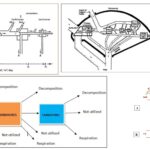Evolution is one of the unifying themes of biology. Evolution involves change in the frequencies of alleles in a population. For a particular genetic locus in a population, the frequency of the recessive allele (a) is 0.4 and the frequency of the dominant allele (A) is 0.6. (c) Identify a particular environmental change and describe how it might alter allelic frequencies in this population. Explain which condition of the Hardy-Weinberg principle would not be met.
Evolution is one of the unifying themes of biology. Evolution involves change in the frequencies of alleles in a population. For a particular genetic locus in a population, the frequency of the recessive allele (a) is 0.4 and the frequency of the dominant allele (A) is 0.6. (c) Identify a particular environmental change and describe how it might alter allelic frequencies in this population. Explain which condition of the Hardy-Weinberg principle would not be met.
Please login to submit an answer.
Answer: Explanation: An environmental change such as a new predator could favor individuals with a particular allele, leading to a shift in allele frequencies. For instance, if the environment favors individuals with the dominant allele (A), their frequency may increase over time. This would violate the Hardy-Weinberg condition of no selection, as differential survival and reproduction would be altering allele frequencies.
- Share on Facebook
- Share on Twitter
- Share on LinkedIn
Helpful: 0%




